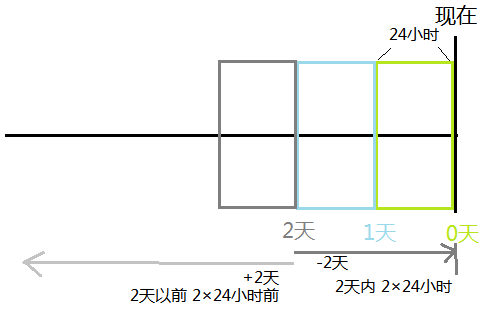文件查找工具locate与find
Posted
tags:
篇首语:本文由小常识网(cha138.com)小编为大家整理,主要介绍了文件查找工具locate与find相关的知识,希望对你有一定的参考价值。
写在前面:
博客书写牢记5W1H法则:What,Why,When,Where,Who,How。
本篇主要内容:
● locate用法
● 使用find基于文件属性进行查找
locate与find简介:
locate与find都是文件查找工具(区别与grep等文本查找工具),尤其是find,可根据文件的诸多属性(如文件大小、属主属组、权限信息、修改时间等),对文件进行实时查找
locate:
1、查找默认数据库文件/var/lib/mlocate/mlocate.db,所以查找速度快,非实时,每天自动更新数据库。手动更新用updatedb命令。
2、既然直接查找数据库文件,所以也不用指定查找路径。
3、自动更新遵循配置文件/etc/updatedb.conf。会排除一些目录及某些字符串结尾的文件。
4、默认情况下,PATTERN包含在整个路径中,不是精确匹配文件名。
find:
实时查找工具,通过遍历指定路径下的文件系统完成文件查找;
工作特点:
查找速度略慢;
精确查找;
实时查找;
locate
find files by name
locate [OPTION]... PATTERN...
-b, --basename:只匹配基名
-i, --ignore-case
-r, --regexp REGEXP
默认支持通配符(glob)
实例:
#查找文件或路径名包含file的文件 [[email protected] ~]# locate ‘file‘ /usr/share/vim/vimfiles/after/lang /var/db/Makefile /var/lib/yum/rpmdb-indexes/file-requires 省略输出... #使用locate查找以".repo"结尾的文件或目录 locate -b -r ‘\.repo$‘
find
search for files in a directory hierarchy
find [-L] [-P] [path...] [expression]
GNU find会自左向右的查找以给定目录为根的目录树,知道查找到结果后,会继续匹配下一个文件。find默认支持使用glob(通配符),欲使用正则表达式,需要使用额外选项。
-P:不展开软链接,当搜索到软链接时,按链接本身对待,而不是查找原文件。默认选项。
-L:展开软链接,当搜索到指向目录的软链接时,查看的文件类型是目录内文件的,而不是软链接本身。除非链接损坏。
语法:
find [OPTION]... [查找路径] [查找条件] [处理动作]
OPTION:
-maxdepth levels:查找的最深路径,当前目录下是1
-mindepth levels:查找的最浅路径
查找条件:
根据文件名称:
-name pattern:匹配文件名,只匹配基名
-iname pattern:文件名忽略大小写,只匹配基名
-regex pattern:匹配整个路径,而不只是基名
实例:
#查找/etc/目录,文件名为*.repo的文件 find /etc -name ‘*.repo‘ #查找/etc/目录,文件名中包含忽略大小写"centos"的文件 find /etc -iname ‘*centos*‘ #查找整个路径中以shell/1.sh结尾的文件,例如想查找文件名为1.sh的文件,但只记得其父目录为shell,不记得其他信息: find / -regex ‘.*shell/1.sh‘
根据属主、属组查找:
-user uname
-uid n
-group gname
-gid n
-nouser
-nogroup
实例:
#查找/var /home /etc /tmp目录中没有属主的文件 find /var /home /etc /tmp -nouser
根据文件类型查找:
-type c
文件类型字符表示:b(block) c(charecter) d(directory) p(pipe) f(regular file) l(symbolic link) s(socket) D(door)
实例:
#查找/dev目录下,文件类型为块设备(block),名称以sd开头的文件 find /dev -type b -name ‘sd*‘
条件组合:
\( expr \):分组,注意两边都保留空格
! expr或-not expr:逻辑非
expr1 expr2或expr1 -a expr2或expr1 -and expr2:逻辑与
expr1 -o expr2或expr1 -or expr2:逻辑或
expr1 , expr2:只匹配expr2的结果,expr1不起作用
条件组合法则:
!A -a !B = !(A -o B)
!A -o !B = !(A -a B)
实例:
#找出/tmp目录下,属主不是root,且文件名不是fstab的文件 find /tmp -not -user root -a -not -name ‘fstab‘ 或 find /tmp -not \( -user root -o -name ‘fstab‘ \) #找出/tmp目录下,属主不是root,或属组不是root的文件 find /tmp \( -not -user ‘root‘ \) -o \( -not -group ‘root‘ \) 或 find /tmp -not \( -user ‘root‘ -a -group ‘root‘ \)
根据文件大小来查找:
-size [+|-]n[cwbkMG]
单位:c(bytes) w(two-byte words) b(512-byte blocks,默认) k(1024bytes) M(1048576 bytes) G(1073741824 bytes)
+n:表示大于n单位
-n:表示小于n单位
find的计算方式与ls -l不同,如查找2k的文件,find会找到1-2k的文件
#查找/etc目录下,文件大小为1M的文件 [[email protected] ~]# find /etc -size 2M /etc/selinux/targeted/contexts/files/file_contexts.bin [[email protected] ~]# ls -lh /etc/selinux/targeted/contexts/files/file_contexts.bin -rw-------. 1 root root 1.3M Mar 8 22:58 /etc/selinux/targeted/contexts/files/file_contexts.bin #可以看到文件大小只有1.3M,但却被find理解为2M的文件,请一定注意! #查找/etc目录下,文件大小大于2M的文件 [[email protected] ~]# find /etc -size +2M | xargs ls -ldh -rw-r--r--. 1 root root 3.6M Mar 8 22:58 /etc/selinux/targeted/policy/policy.29 -r--r--r--. 1 root root 6.7M Mar 3 18:59 /etc/udev/hwdb.bin #查找/etc目录下,文件大小小于2M的文件 [[email protected] ~]# find /etc -size -2M | grep file_contexts.bin [[email protected] ~]# #可以看到查找结果中并没有上面例子中出现的文件大小为1.3M的文件,因为find会认为小于2M是0-(2-1)M。
根据时间戳:
-atime [+|-]n:atime属性在第n天[前|内]
-ctime [+|-]n:ctime属性。。。
-mtime [+|-]n:mtime。。。
-amin [+|-]n:atime在第n分钟[前|内]
-cmin [+|-]n:ctime。。。
-mmin [+|-]n:mtime。。。
-anewer file:atime比file文件新(晚)
-cnewer file:ctime。。。
-newer file:mtime。。。
注意:以天为单位,从0开始计数,0表示过去24小时,如图:
实例:
#查找/tmp目录下,访问时间在24小时内的文件并详细显示 [[email protected] ~]# date +"%F %T" 2016-03-10 10:37:26 [[email protected] ~]# find /tmp -atime 0 | xargs ls -ld --time atime -t --full-time drwxrwxrwt. 16 root root 4096 2016-03-10 10:35:34.037896700 +0800 /tmp drwxr-x-w-. 2 root root 18 2016-03-09 21:54:19.443113494 +0800 /tmp/xx -rw-r--r--. 1 root root 58 2016-03-09 18:30:40.551043611 +0800 /tmp/date.log -rw-r--r--. 1 root root 196 2016-03-09 18:30:40.551043611 +0800 /tmp/memory.txt drwxr-xr-x. 2 root root 38 2016-03-09 11:13:18.426879619 +0800 /tmp/vmware-config0 drwx------. 2 root root 4096 2016-03-09 11:13:18.426879619 +0800 /tmp/vmware-root drwxrwxr-x. 3 mageedu mageedu 18 2016-03-09 11:13:17.844872897 +0800 /tmp/mageedu #查找当前路径下,比functions.bak文件内容改动时间更新(晚)的文件 [[email protected] ~]# ls -l --full-time functions.bak -rw-r--r--. 1 root root 14391 2016-03-09 16:46:30.772901402 +0800 functions.bak [[email protected] ~]# find . -newer functions.bak | xargs ls -ld --full-time -t drwxr-xr-x. 2 root root 29 2016-03-10 10:32:38.310467090 +0800 ./.cache/abrt -rw-------. 1 root root 11 2016-03-10 10:32:38.309467082 +0800 ./.cache/abrt/lastnotification dr-xr-x---. 7 root root 4096 2016-03-10 10:32:38.297466990 +0800 . -rw-------. 1 root root 268 2016-03-10 10:32:38.297466990 +0800 ./.Xauthority -rw-------. 1 root root 20626 2016-03-10 10:28:12.176531057 +0800 ./.bash_history -rw-------. 1 root root 6877 2016-03-10 10:28:05.687488818 +0800 ./.viminfo -rw-------. 1 root root 81 2016-03-09 23:47:30.380374947 +0800 ./.lesshst drwxr-xr-x. 2 root root 54 2016-03-09 22:12:39.964026062 +0800 ./test -rw-r--r--. 1 root root 0 2016-03-09 22:12:39.964026062 +0800 ./test/1.sh -rw-r--r--. 1 root root 527 2016-03-09 17:27:20.207755863 +0800 ./.ssh/known_hosts
根据权限查找:
-perm mode:指定准确权限
-perm -mode:ugo三组都必须满足mode,实际权限可以大于mode
-perm /mode:ugo三组有一组满足mode即可
实例:
#查找$PATH路径下下,所有用户都有执行权限,且其它用户有写权限的普通文件 [[email protected] ~]# find `echo $PATH | tr ‘:‘ ‘ ‘` -perm /113 -type f 省略输出.... /usr/bin/screen /usr/bin/koi8rxterm /usr/bin/resize /usr/bin/stap-merge /usr/bin/stap-report /usr/bin/catman #查找/etc目录下至少有一类用户没有执行权限的文件; [[email protected] ~]# find /etc/ -not -perm -111 省略输出.... -rw-r--r--. 1 root root 6 Dec 9 17:59 /etc/yum/vars/infra -rw-r--r--. 1 root root 444 Dec 3 23:33 /etc/yum/version-groups.conf -rw-r--r--. 1 root root 2534 Dec 3 23:33 /etc/yum/yum-cron.conf -rw-r--r--. 1 root root 2496 Dec 3 23:33 /etc/yum/yum-cron-hourly.conf #查找/etc目录下所有用户都没有写权限的文件 [[email protected] ~]# find /etc/ -not -perm /222 | xargs ls -ld -r--r--r--. 1 root root 460 Nov 20 23:07 /etc/dbus-1/system.d/cups.conf ----------. 1 root root 742 Mar 9 11:03 /etc/gshadow ----------. 1 root root 731 Mar 8 10:45 /etc/gshadow- 省略输出....
处理动作:
-delete:直接删除查找到的内容,不会提示!!!
-exec command {} \; :其中{}代表前面查到的内容
-fls file:执行-ls动作,并且把结果保存至文件
-ls:相当于ls -dils,只显示目录,显示inode,长格式,以blocks显示文件大小
-ok command {} \; 与exec类似,但会每一步操作都提示用户
-print:输出到屏幕,默认动作
-prune:修剪。排除
实例:
#查找当前目录,并排除dir1目录,名称以file开头的文件 [[email protected] test]# mkdir dir1 dir2 [[email protected] test]# touch dir1/file{1..3} [[email protected] test]# touch dir2/file{1..3} [[email protected] test]# find . -path ./dir1 -prune -o -name file* -print ./dir2/file1 ./dir2/file2 ./dir2/file3 #查找/var/log目录,大于1M的文件,并提示是否删除 [[email protected] ~]# find /var/log -size +1M -ok rm {} \; < rm ... /var/log/audit/audit.log > ? n < rm ... /var/log/messages-20160308 > ? n #查找/etc目录下最近一周内其内容修改过,同时属主不为root,也不是hadoop的文件或目录,将结果保存至/tmp/weekmodify.result。 [[email protected] man1]# find /etc -mtime -7 -not -user ‘root‘ -not -user ‘hadoop‘ -fls /tmp/weekmodify.result [[email protected] man1]# cat /tmp/weekmodify.result 201327388 0 drwx------ 2 polkitd root 63 Mar 4 02:44 /etc/polkit-1/rules.d
本文出自 “FredDream” 博客,请务必保留此出处http://1036416056.blog.51cto.com/5943987/1749532
以上是关于文件查找工具locate与find的主要内容,如果未能解决你的问题,请参考以下文章

